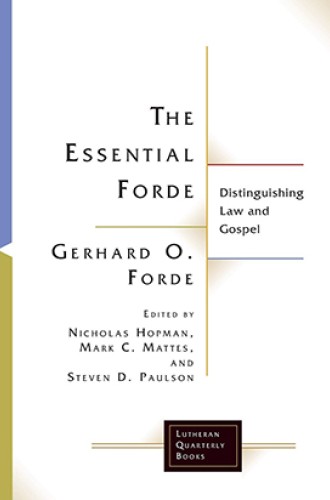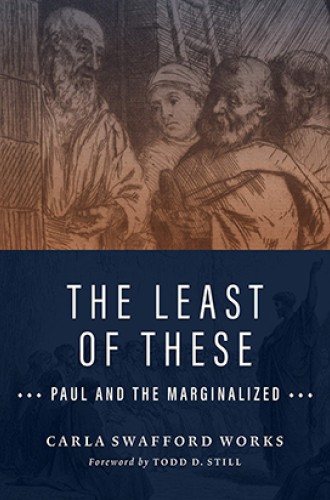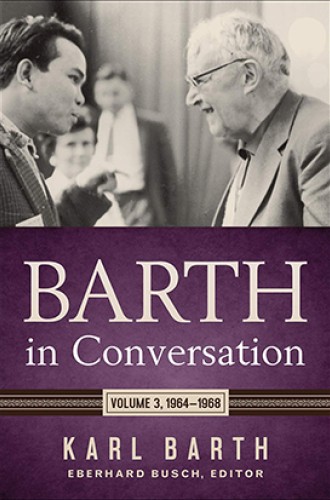A few years ago, while I was on medical leave with cancer, I had two epiphanies. First, I rediscovered—I felt it in my bones and my belly—that the gospel of Jesus Christ really is the best news out there in the world. The message of grace not only gladdens the heart, but it is the power by which the living God rectifies creation. Second, I realized, to my shame and regret, that I had not been preaching it. I had muddled the gospel with the law into a kind of glawspel, assigning my listeners to-do lists rather than presenting Christianity as the announcement of what has already done for them. To use a distinction Fleming Rutledge often talks about, my preaching was hortatory rather than proclamation. Instead of comforting my hearers, I was exhausting them.
The gospel is the promise in which God gives Christ to us, making proclamation a matter of life and death. Preachers therefore have no choice but to stand before their listeners like Nathan to David, killing and making alive with God’s own words.
Read our latest issue or browse back issues.
In The Essential Forde: Distinguishing Law and Gospel (Fortress Press, edited by Nicholas Hopman, Mark C. Mattes, and Steven D. Paulson), the late Lutheran theologian Gerhard O. Forde shows how a sacramental piety of the word forces a rethinking of theology, proclamation, and even church history. If the gospel is an aural sacrament, proclamation is much more than reporting, albeit with rhetorical polish, on the past acts of God. It is an apocalyptic event in which preachers deliver Christ himself to their hearers.
The importance of the medium renders the coherence of the message critical. Theology exists not to add to the arcana of the academy. Theology exists for the sake of proclamation. Its purpose is “to get someone to preach plainly and simply.” This prioritization of proclamation leads Forde to reexamine theological doctrines from a homiletical perspective.
For example, Forde eschews all atonement theories in favor of seeing the cross simply as our being caught up in a murder. A theory that might tidily explain the atonement pales next to the happy news that the one we tried to mute with a cross speaks a surprising word with his resurrection. Forde’s orientation of theology toward proclamation empowers preachers to recover their eschatological nerve and be as clear as Peter on Pentecost: “This man who you crucified . . . God raised him up.”
Luke reports in the Acts that Peter’s congregation that day was cut to the heart. This image captures Forde’s framing of proclamation as primary discourse: it accomplishes something in its hearers. The purpose of theology is to help “people to do the gospel rather than talk about the gospel.” Unlike Grünewald’s image of John the Baptist, whose long, bony finger points away from himself to the crucified Christ, Forde’s preacher speaks for God.
Preaching, Forde writes, “is not an account of what happened in the past, such as ‘God so loved the world,’ true as that is. Such accounts are past tense. Proclamation is present tense: ‘I, here and now, gift to you Christ himself.’ This is God’s present move, the current ‘mighty act’ of the living God.” No matter what St. Francis of Assisi allegedly said, the gospel requires words because preaching, Forde clarifies, is God saying in the here and now, “I love you.” In other words, proclamation is the mode in which God’s gracious and eternal election of us gets worked out in real time.
Forde believes that possessing Christ through faith in the gospel promise sets us free to be down to earth. And down to earth, rather than up in glory, is precisely where God meets us. Will Willimon, in his highly theological memoir Accidental Preacher (Eerdmans), exemplifies the self-effacing humor and playfulness of someone whose life down here on earth has been hijacked by the presence of a talkative God.
Accidental Preacher—accidental in the sense of fortuitous and serendipitous—illustrates the way the loquacious God of Protestant theology is also necessarily a living God at work in the world. A God who gives Christ to us through proclamation must also be a God who works by vocation, electing and grabbing hold of conversation partners called preachers. And because the only candidates God has available are reluctant sinners like us, God has no choice but to be a God of grace.
Willimon weaves together memories—from his episcopacy and preaching ministry, but also from his growing up with a con artist father and as a white boy amid the unfettered racism of the Jim Crow South—so that together they present a kind of coda to Mark’s cliffhanger Easter story. God is alive and at work in the world, the memoir shows, just as in Willimon’s own life God has been on the prowl. “My curriculum vitae is a string of incursions,” Willimon observes, “when unexpectedly, often belatedly, I discovered that I was being pursued by a God who refuses to take no for an answer.”
If Forde helps preachers to reflect on the nature of their craft, Willimon demonstrates how ordinary Christians might go about theological reflection. Writing about a Methodist youth retreat he attended as a teenager, Willimon sees that he was, fortuitously, paired with a black youth from his own town. “Does it bother you that there are laws that separate us, keep you in your place and me in mine?” the teenager, Charles, asks Will one night. Willimon, in his context of unexamined racism, hadn’t been bothered by it until that moment. About their ensuing nightlong conversation, Willimon confesses, “I had my world skillfully cracked open [by God], exposed, infinitely expanded and disrupted.”
In just this way, Accidental Preacher is a gift not only for those who proclaim the gospel but for those who receive it. It models with wit and humor how we all might go about discerning the cracks the living God creates in our world. Once we’ve been exposed and infinitely expanded, there is still the question of how this divine disruption reorients us toward our neighbors.
If the gift of Christ makes God’s forgiveness ours, as Martin Luther so compellingly showed, then we should be freed to love our neighbors as our neighbors rather than as the objects of our anxious quest for enoughness. But does this Protestant piety of the word actually lead to works of love, or does it provide an attractive rationalization for believers to avoid them? If the latter, perhaps the deficiency is less in Protestant theology than in its reliance upon the writings of the apostle Paul.
Paul does not, Carla Swafford Works notes in The Least of These: Paul and the Marginalized (Eerdmans), enjoy a reputation for caring about those Jesus calls the least of these. It’s true, she concedes, that “in efforts to protect Paul from a works-based righteousness, sometimes the baby has been thrown out with the bathwater,” but it’s also the case that most books on Pauline theology focus on categories like soteriology, Christology, eschatology, and ecclesiology because concern for the community’s care of the vulnerable is not immediately front and center in Paul’s epistles. At least not obviously so.
But Works reexamines Paul’s letters, putting them in their historical context, to show that the poor were not only a thoroughgoing concern of the apostle’s but also his constituency. For instance, the Galatians, whom Paul gives exalted status by calling them “children of the promise,” were a subjugated people, derided by the Romans. In fact, Works adds, “most of the Pauline communities contained folks who lived at, near, or slightly above the subsistence level.”
Rather than ignore the least of these in his epistles, Paul is entrusting them with what he takes to be the best news in the world. He charges Phoebe, for example, to be not simply the courier of his correspondence to the church in Rome but also its proclaimer and interpreter.
Works concludes The Least of These with a lament. Whether the focus is the preaching office, the care of souls, social justice, or compassion for the poor, the church too often operates with a reductionist gospel. “We have a tendency,” she writes, “to think that the gospel is about us. . . . The gospel is not just about whether Jesus is in your heart. The gospel is about God—plain and simple.” Christians too often fail to account for the gospel as the account of God contending against hostile, anti-God powers in order to rescue a beloved but captive creation.
If one needs to locate evidence of how a Protestant piety of the word can set believers free for both cheerfulness and concern for the cosmic scope of God’s gospel work, then the Karl Barth of Eberhard Busch’s third collection, Barth in Conversation: Volume 3, 1964–1968 (Westminster John Knox) could serve as exhibit A.
The elderly Barth who incarnates these exchanges with students, pastors, and church groups is a far cry from the polemical tone of his Romans commentary or the intimidating density of his Church Dogmatics. Busch records a winsome Barth out of whom a gospel-centered concern for the world spills naturally, with humor and urgency.
In a 1964 interview, Barth makes clear that Jesus Christ as the assurance of the forgiveness of sins “cannot be significant only within the church.” Grace, says Barth, must always lead Christians to engage the world, for grace is but another name for Jesus Christ and he is the world’s true Lord. “As a pastor, I preached a kind of social gospel,” Barth tells students in Bossey. “But then, afterward, I discovered that in the New Testament there is an element, an element of revolution, which is bigger, stronger, and more all-embracing than what I have learned in the socialist movement.”
What is that element of revolution? That God is no farther from us than the promise of grace through Christ that rings in our ears. As Barth says to his longtime friend Eduard Thurneysen: “Indeed the world is dark. Still, let us not lose heart! Never! There is still someone who reigns! God does not let us fall, not a single one of us and not all of us together! Someone reigns!”









